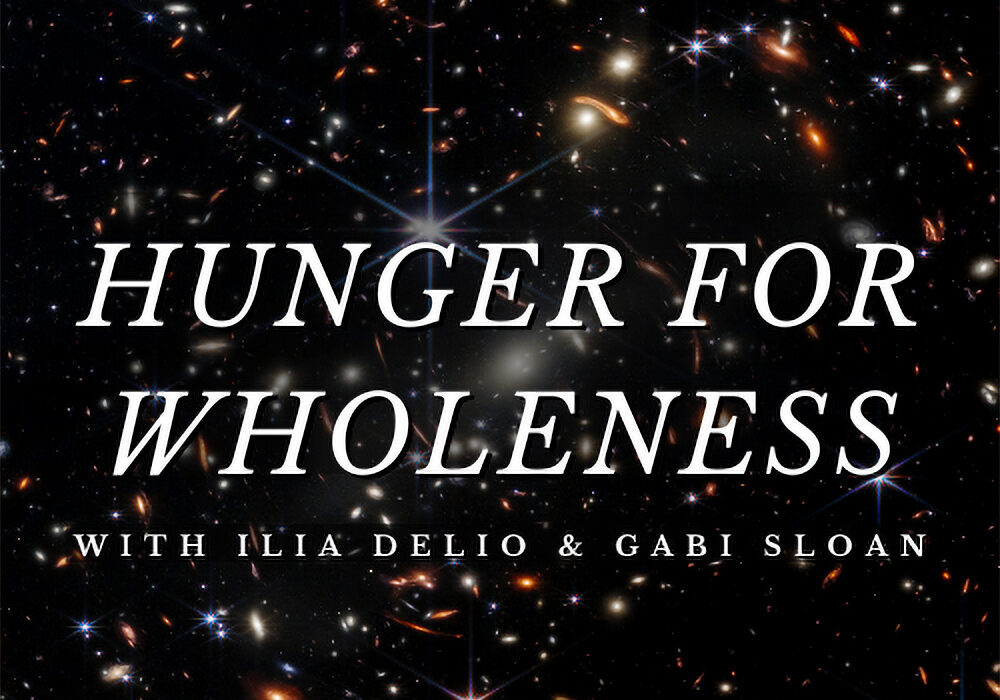What is God Today? God and Cyborg Life
“God crosses the boundary of divinity to become human without losing anything of divine nature. We call that the person of Jesus Christ.”
– Ilia Delio
Ilia Delio, in this sixth video of our seven-part series on “What is God Today?”, explores God and Cyborg Life: “God is a boundary breaker. If we live into it, we become part of God’s ongoing creativity. All boundaries that thwart love must be dissolved or overcome.”
+
VIDEO TRANSCRIPTS
by Jennifer Wallace
So, the question of cyborgs.
I know this is a difficult term for some because it’s so strange to us. It sounds like something right out of science fiction. And, of course, cyborgs—with computer technology—all emerged around the same time period, which would be the mid-20th the 50’s and early 60’s. And basically, what we learned in that period, as we began to study nature in different ways, was that nature is information- driven, that nature works by complex dynamical systems, that nature works by feedback loops, that cybernetics is part of the way systems work in nature. So, building a computer just seemed a way of extending what nature has already been for some 13.7 billion years. The cyborg symbolized for us that what we count as human should not just be assumed. The human is not a fixed entity. We’ve never been fixed, by the way. We have emerged after a long period of time in evolution and therefore, the bounds of what we are can change and they are changing.
So, why is that? Now we go back to the ground of our being. From a religious perspective we name that ground, as our creator, as God. And so—God as a boundary crosser. God, you might say, crosses the boundary of divinity to become human without losing anything of divine nature. And we call that the person of Jesus Christ.
If we live into it, we become part of God’s ongoing creativity, which means we move out into the world in a creative stance, that we begin to form new wholes, we cross boundaries. We push boundaries aside and we say, “No, this boundary constricts what God is and what God is seeking to become in love. And therefore, all boundaries that thwart love must be dissolved or overcome.”
We are living in that centeredness of God’s being in love. We must be the boundary crossers. We must be the cyborgs. We must hybridize and bring together what’s still separated, what’s still subjugated, what’s still oppressed.
And this is where I see Jesus as cyborg. He’s the boundary breaker. He’s the trickster, as Donna Haraway says. That’s the one thing from the Christian side of things— it is not a domesticated religion. You don’t not sit in a comfortable center and give money in the box and think you’re going go to heaven.
You need to be a trickster, a boundary crosser. You need to be a boundary breaker because you are invited into a radicalization of love. That is what God is. The radicalization of love is the Incarnation. And what we are saying is that we are part of God’s Godness. We’re part of God’s life and that life is seeking to become more being in love and cannot do it without us.
So, welcome to Christianity.
 View print-friendly version
View print-friendly version
3 Comments
Related Posts

Hunger for Wholeness Podcast Launches!
Story matters. Our lives are shaped around immersive, powerful stories that thrive at the heart of our religious traditions, scientific inquiries, and cultural landscapes. All stories – big and small…

God’s nature is cyborg nature.
Divinity reaches outside itself by incarnating in creation.
Humans must do the same.
Human nature is also called to be cyborg.
Thank you Sr. Ilia
I’m so glad a theologian like Dr. Delio speaks so clearly bringing reverent and divine language to the conversation of cyborgs. The human species will evolve through artificial intelligence from homo sapien sapien to a new species. Can we evolve with mutuality and diversity to a species emergent in Teilhardien love? Or will we remain in the modern mindset of separateness and individualism in a cyborgian vision of Homo Deus as suggested by Yuval Harari? I think we are called to change our cosmology and metaphysics, which is the hardest thing for a culture to do.